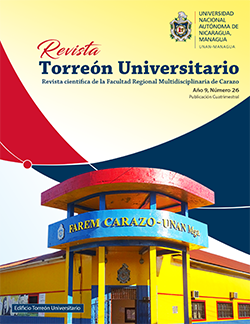Collaborative learning as a didactic strategy to promote oral English practice in extra-school hours using Google Hangouts
DOI:
https://doi.org/10.5377/torreon.v9i26.10255Keywords:
collaborative learning, Google Hangouts, English oral practice, extra school hoursAbstract
The present study aims to analyze the incidence of collaborative learning to promote oral English practice in extra-curricular hours among students in the third year of the English career during the second semester of 2017: Google Hangouts as a technological application. This study is positioned in the socio-critical paradigm, with a mixed approach, which is descriptive and cross-sectional. The sample was of 38 informants, 4 teachers, and 34 students. The survey and the interview were used as information collection instruments validated through a pilot and expert judgment, respectively. The data were analyzed using SPSS version 21 software in the quantitative phase, and in the qualitative phase, using matrices of main categories, then a triangulation of the information obtained was carried out.
As main results, we found that most of the students are familiar with the use of Google Hangouts, and motivated to practice English through this tool, as well as through participation in collaborative learning activities, which contributed to improving other English sub-skills that foster the development of oral competence. On the other hand, teachers do apply activities oriented to the practice of English through ICT resources, but these are not directly focused on the development of oral language practice.
In conclusion, the study showed that it had a positive impact both on the motivational aspect of the students, as well as on their competencies and communication skills in the English language.
Downloads
Downloads
Published
Issue
Section
License
The authors who publish in this journal agree to the following terms.
- The author or authors of the articles, essays or research grant the National Autonomous University of Nicaragua, Managua (UNAN-Managua) the editing rights (copyright) of the submitted work, therefore the University has the exclusive right to publish the article for the entire copyright period.
- These copyrights/authors authorize Torreón Universitario Magazine and the University to edit and disseminate/publish the article in said Magazine, including printed and electronic reproduction, storage, retrieval and any other type of publication, and sources of secondary information as services. of summaries and databases, they also empower it to protect the article against unauthorized use for dissemination by printed or electronic media (PDF, HTML, EPUB, XML or others).
License for use of content
The magazine uses the Creative Commons Attribution-NonCommercial-NoDerivs 4.0 International License.
Under this statement:

This journal is licensed under a Creative Commons Attribution-NonCommercial-NoDerivatives 4.0 International License. It can be copied, distributed and transmitted publicly as long as the author and source are cited (Revista Torreón Universitario), it should not be modified or used for any commercial purpose. The full license can be found at http://creativecommons.org/licenses/by-nc-nd/4.0/.



